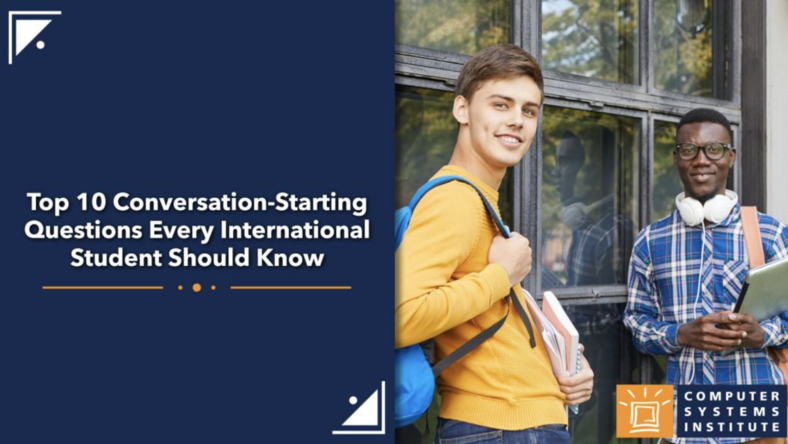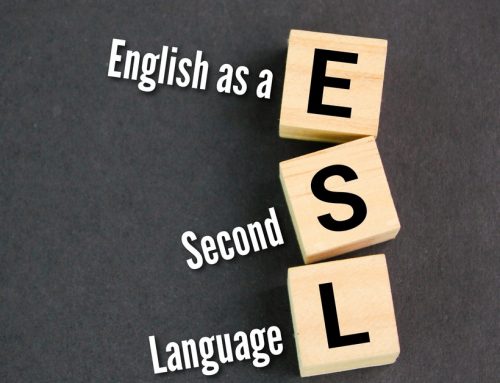When international students come together as a class for the first time, it can be a pretty daunting and challenging experience. It’s only natural to wonder about how to connect with their new classmates. In such a diverse room, with students coming together from different ethnic and cultural backgrounds, what does one do to strike up a conversation? That is the central question of today’s blog.
Here are ten of the top conversation-starting questions that will get international students talking, sharing, and connecting with one another.
Question 1: Your accent is interesting, where are you from?
In a room of international students, asking where the other is from is a great way to begin any conversation, especially the first encounter with another student.
Our countries of origin become a perfect conversation-starting point and help us begin to understand and appreciate how far we’ve all come to be together in this place of learning.
Question 2: Can you tell me about yourself?
It’s a basic starter question, but it’s solid and invites the other speaker to share information about themselves that will help you understand them and, more importantly, find areas that you have in common with that person. The other great thing about this question is that it’s open and easygoing. It doesn’t demand any specific information and allows your classmate the space to choose what they share and what they don’t.
Question 3: Have you experienced any difficulties in America so far?
This isn’t a question designed to get people badmouthing America, but rather to establish some shared experience between students of different cultures and nationalities. It gets them focused on common ground. It could be that both you and your classmate experienced some trouble at the airport with the TSA or that you had a taxi driver who wouldn’t stop chattering, or you might have both gotten lost on campus.
Whatever your experiences so far, it’s these challenging ones that often bring people together the most. When you find others who’ve experienced the same difficulties, it’s easier to laugh about them and not let them bother you so much.
Question 4: What do you do in your free time?
You and a classmate might come from totally different corners of the world. Still, you can easily be brought together by your shared love of something like cooking, chess, video games, reading, poetry, creative writing, or something else. Hobbies are an incredible kind of “social glue” that holds people together regardless of their surface differences.
Once again, this question is also nice and open. It doesn’t demand specifics such as “Do you play chess?” You have a far better chance of finding connections when you keep things as open and easygoing as possible.
Question 5: What brought you to this school?
It’s interesting to find out what brought you and another person from a different country to this particular school. It could be that both of you share the same ambitions or found the same thing about the school attractive and appealing. It’s yet another perfect way to discover common ground and common interests with your classmates. Furthermore, it helps build a sense of camaraderie in the classroom as we learn that we are all in it together to achieve our goals.
Question 6: Are you enjoying the food here?
Cuisine is another great uniting force between different cultures. It might be that you are both loving the food here, or perhaps you find it lacking. In either case, you can once again discover a common thread between you that unites you despite the difference in nationality and/or culture. It’s also a terrific pretext to find chances to get together to have lunch where one can recommend a good place to eat where the other has been struggling to find somewhere they enjoy.
Question 7: Do you have any suggestions for fun places in this town?
This question is a terrific way to benefit from other people’s experiences. While it might be your first time in a classroom together, it doesn’t mean you’ve all just arrived in the country. If you are new in town, you can learn from others about great places to hang out and enjoy a social life. You might also share your experiences with others.
Question 8: If you weren’t here studying now, where would you be?
This is a somewhat more roundabout way of asking what people they like to do in their free time, such as hobbies and pastimes. The difference is that this way of asking the question is a little more creative and thought-provoking. When you ask the question in this way, it gets the other person really thinking about their answer and more engaged with the question because it perhaps sounds a little less hum-drum than the common question of “what do you do in your free time?”
Question 9: What are your plans for when you graduate?
You and your classmates will invariably have big plans for the future. That’s why you’re here studying. Ambition and desires for the future are another great set of uniting forces that bring people of different languages and cultures together. But, in the end, most people want to live their lives and be happy. It doesn’t change much from nation to nation, and it becomes a powerful friendship builder.
Question 10: Do you want to grab some lunch?
Finally, we come to the last and most powerful question of all. Everyone needs to eat, and lunch between classes is an easy way to bond with your fellow learners. These bonds are easy enough to form, just so long as someone is willing to ask the question!
Conclusion: Speak Up and Connect Faster
If there’s one thing that makes the international student experience all the more enjoyable, it’s the ability to form lasting connections and friendships with your classmates. It’s a formative and life-changing experience to live as an international student and made all the more valuable by the people you spend your time with.
You may notice many of the questions above are designed to help students find the many things they likely have in common. There’s no focus on differences but rather trying to find common ground on which international students can build their friendships.
Remember to speak up and break that ice because it could be the start of something really fantastic.
At CSI, our students enjoy the connections they make and create lifelong friends. If you’re looking for a place with friendly students, faculty, and staff, we’re just a phone call away.






